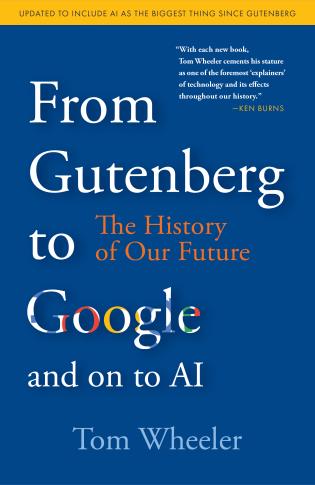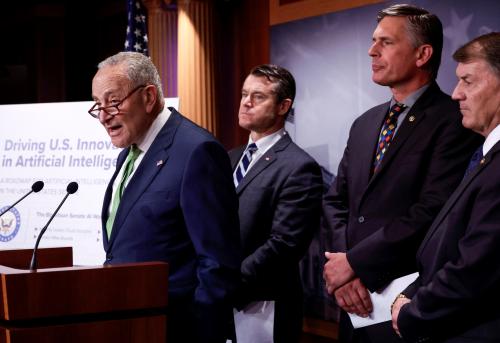Artificial intelligence (AI) is the biggest thing since Johannes Gutenberg’s 15th century movable type printing press. Gutenberg released ideas and information from captivity; AI accelerates their analysis to produce conclusions that expand the boundaries of knowledge.
Looking at the experiences of the Gutenberg revolution provides guideposts to inform our 21st century response to AI. Such a review begins with the importance of looking beyond the technology per se to oversight of the effects it produces.
Gutenberg’s revolution
Low-cost printing picked the lock that had previously held information prisoner to the priestly and powerful. By expanding the distribution of information, printing democratized and stimulated human inquiry. It was the original information revolution.
AI has created an intelligence revolution. Replacing the linear process of human cognition with an algorithmic capability to identify patterns and reach conclusions at scale is an exponential expansion of human understanding.
The Gutenberg revolution showed that it is not the principal technology, but its secondary impact. The secondary impacts of printing included the Reformation, spreading the ideas of the Renaissance, and enabling the hypothesis and challenge process that we call the scientific method. We are just beginning to see the secondary impacts of AI. We can be certain that what we have seen in recent months is the slowest pace of AI-driven change we will ever see.
Resistance is futile
“We must root out printing or printing will root us out,” the Vicar of Croydon warned in the 16th century. It is a cry that echoes today when Elon Musk warns that AI is “summoning the demon.”
Once AI escaped from research labs it took on a life of its own. Gutenberg produced what today would be called open-source technology–i.e., a design that can be replicated and improved by others. Thanks to being replicable, within half a century of Gutenberg’s first press, every major European city had their own printing establishments. The result was more books printed during that period than had been produced by scribes in the previous thousand years.
AI technology is also open-source. While headline companies such as OpenAI (despite its name) are closed models, AI is proliferating in open-source. By one estimate, there are over 8,000 open-source generative AI models available on GitHub, a collaborative software platform.
In the laboratory, AI can be controlled. However, the proliferation of open-source AI has released this powerful technology into the wild.
Focus on AI’s effects
Both Gutenberg’s press and AI redistribute power. Such power, Google CEO Sundar Pichai explained, “is too important not to regulate and too important not to regulate well.”
Structuring such oversight is a challenge. Dictating the behavior of thousands of individual AI models may be an impossible expectation, but that does not preclude assessing AI activity through risk-based oversight enabled by transparency and audits. The difficulty inherent in regulating the technology itself means the most logical approach to getting control of the AI revolution is to focus on its effects.
In 1515, Pope Leo X responded to the disruptive effect of printing. Since he could not control the widely dispersed technology itself, he focused on its output and forbade the publication of any book without the Church’s approval. It was ham-handed, but demonstrated how the inability to control an open-source technology initiates the need to focus on the effects of that technology. Today, Pope Francis seems to share such an approach, but in a more sophisticated and aware manner. In his remarks at the recent G7 meeting, the Pope focused less on the technology itself and more on the ethical issues associated with AI applications.
Oversight of the effects of AI can be broken into at least three components. The first is dealing with how AI expands old-fashioned abuses. Consumer scams are made easier by AI. AI can enhance discrimination in placement, promotion, or pay. Identity theft and cybercrime are expanded by AI. Fortunately, the solutions developed in the analog era for dealing with such abuses can be harnessed to deal with their AI enhancements. As Federal Trade Commission (FTC) Chair Lina Khan put it, “There is no AI exemption in current law.”
A second effect of AI is its expansion of already existent digital era abuses, such as privacy, competition, truth, and online safety. We have already lived through the exploitation of digital information to manipulate individuals and markets. One must assume that AI companies’ constant quest for better trained large language models (LLMs) isn’t just a science project, but an effort to improve such profitable manipulation even further. European and UK leaders have developed new policies for dealing with the new digital challenges; their American counterparts continue to sweep such issues under the rug. It is foundational, however, that oversight of the effects of AI cannot be accomplished absent oversight of the digital platforms that enabled the new AI capabilities.
Finally, there are the unknown unknowns of AI. We may not know what the next generation of AI effects will be, but we can be certain they are coming. This common sense should be the early warning signal to prepare for a storm. It is the consumer-facing, chat-like application of AI that has thus far caught the public’s fancy. Beyond such capabilities, however, AI is inexorably working its way into the foundations of everything we do. Add to this the ongoing drive for general AI (GAI) in which an AI algorithm can autonomously improve itself. To deal with such realities is beyond the capability of government structures developed in the industrial era to deal with industrial challenges. In anticipation of the unknown unknowns, individual governments must create new expert agencies utilizing procedures nimble enough to deal with the agility of computer-driven intelligence.
Making new history
We should not delude ourselves in the belief that we can control AI technology itself, as opposed to overseeing its effects. The application of new technology produces upheaval long before it permits stability.
If we listen, the Gutenberg experience can inform us today. Our goal must be to seek stability through supervision of the effects of the technology. It is an achievable goal if we act with the speed and decisiveness of AI itself.
-
Acknowledgements and disclosures
Google is a general, unrestricted donor to the Brookings Institution. The findings, interpretations, and conclusions posted in this piece are solely those of the authors and are not influenced by any donation.




Commentary
Gutenberg’s message to the AI era
Based on "From Gutenberg to Google and on to AI" (Brookings Press, 2024)
July 16, 2024